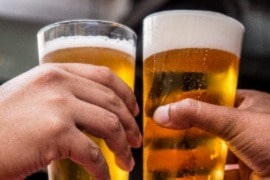Alcohol can cause skin reactions like rashes, flushing, redness, itching and other symptoms.
Article at a Glance:
- Skin reactions related to alcohol use are not common and most of them are not dangerous. These reactions can be caused by many different factors, so it is important to take note of these reactions if they happen to you or a loved one. Key points to remember about alcohol-induced skin reactions include:
- Alcohol use can cause skin reactions like rashes, flushing, redness and itching, among other symptoms.
- Being aware of the circumstances associated with alcohol-related skin reactions can help you to determine what the cause is, whether it’s a drug interaction, an underlying skin condition that is triggered by alcohol, using a certain type of alcohol or an actual alcohol allergy.
- Limiting or avoiding alcohol (or a particular kind of alcohol) can be a great solution to prevent unpleasant reactions.
- A discussion with a healthcare professional may also help determine the reasons for a skin reaction along with treatment and prevention options.
Alcohol and Rashes
Many people experience a variety of adverse effects due to alcohol use, including nausea, vomiting, impaired decision-making skills, aggression, loss of consciousness and visual impairment, among other symptoms. Alcohol use can also cause various skin reactions, including rashes.
Alcohol consumption can occasionally lead to skin reactions like:
- Skin redness
- Rashes
- Itching
- Skin flushing
Skin reactions associated with alcohol use can range from mildly uncomfortable to quite severe, depending on the person. However, these effects are fairly uncommon in the general population. Certain people appear to simply have an intolerance to alcohol, which could be due to many factors.
Causes of Alcohol-Related Skin Reactions
Skin reactions can occur after alcohol consumption because of:
- Genetics (which may relate to sudden alcohol intolerance)
- Drug interactions
- How alcohol is prepared and consumed
- Pre-existing allergies
Genetics
Alcohol-induced skin reactions can stem from a genetic inability of the body to process alcohol properly. This inability is especially common in people with East Asian ancestry, who may experience extreme redness and warmth in the skin after consuming even small amounts of alcohol.
Drug Interactions
Drinking alcohol with certain drugs, including antibiotics, can cause drug interactions resulting in uncomfortable skin reactions, especially flushing. One common antibiotic medication, metronidazole, is especially associated with this kind of reaction when used with alcohol. This reaction is called a disulfiram-like reaction and often causes nausea, vomiting, headaches and stomach pain in addition to the skin flushing.
Although this drug interaction results in undesirable symptoms, it is usually not life-threatening. Anyone experiencing this reaction, especially if vomiting is present, should try to stay hydrated. The symptoms usually subside on their own after the alcohol is broken down by the body.
It is not recommended to use alcohol during a course of metronidazole therapy, or even several days after the course of therapy is finished. Other drugs can also interact with alcohol in this way, so it’s important to speak with a doctor or pharmacist before using any medication with alcohol.
Alcohol Preparation and Consumption
Alcohol can also be prepared in many different ways and mixed with various other substances before a person consumes it, and it is thought that certain impurities, including preservatives, may contribute to the development of some alcohol-related skin reactions.
Some cases of alcohol-related skin reactions may not be caused directly by alcohol itself, but because of the impurities present in the alcohol. Some people may react to one type of impurity (for example, the sulfites that are sometimes found in wine) and may not react to others. A person who is allergic to wheat might have skin reactions only after consuming alcohol that is made with wheat, such as beer.
Alcohol-Induced Allergic Reactions
A common skin condition called rosacea can sometimes flare up after alcohol intake. Rosacea is a redness of the skin that often looks like blushing or flushing, and can be associated with stinging, sensitivity, burning sensation and dryness.
In general, alcohol does not cause rosacea, but it can trigger rosacea symptoms in some people. A 2017 study of American women found that the risk of rosacea increased as alcohol intake increased, however, other studies have not found the same association.
There have been some reported cases of a genuine allergic reaction after alcohol consumption, including symptoms of itchiness along with lip and tongue swelling, but this type of alcohol allergy is rare.
Usually, skin reactions related to alcohol are due to an intolerance rather than an actual allergy. It’s important to note that some alcohol-related skin reactions may occur for unknown reasons.
Alcohol & Skin-Related Symptoms
There are various skin reactions related to alcohol use. Some common skin-related symptoms that can occur with alcohol consumption include:
- Flushing (redness and warmth in the skin, especially in the face)
- Rash (skin irritation and itchiness)
- Hives (raised, red patches of skin)
- The triggering of an allergic reaction, like rosacea
- Acne
- Swelling
- Stinging, tingling or burning sensations
- Itchiness
- Pain
Alcohol Rash & Hives Pictures
Viewing alcohol rash pictures can be helpful in identifying alcohol-related skin irritations.
Treatment for Alcohol Rashes & Allergies
Although alcohol-related skin reactions can be bothersome or uncomfortable, the vast majority are not life-threatening. As the alcohol is broken down and eliminated from the body, the symptoms generally go away.
In many cases, simply stopping the intake of alcohol allows the breakdown process to occur and symptoms will resolve on their own. Alcohol is broken down at different rates depending on individual factors such as body weight, body fat percentage, hydration level, gender, the presence of liver disease and recent food intake. Alcohol may leave the body more slowly (or more quickly) in certain people compared to other people.
For people who have skin reactions to alcohol, often the best advice is to avoid alcohol altogether or to minimize the amount consumed to prevent a reaction from occurring in the first place.
In more severe cases, medical treatment may be required. If the reaction is severe enough to cause swelling of the face, tongue or throat, a true alcohol allergy may be present, which can be life-threatening. A reaction like this requires immediate medical attention in order to keep a person’s airway open.
Have more questions about alcohol use? Interested in other alcohol-related topics? The Recovery Village offers resources for people to learn more about alcohol abuse and alcohol use disorders, as well as comprehensive alcohol rehab treatment programs.
Articles Related to Alcoholism

Alcohol detox isn’t easy and not everyone can do it on their own. That is why alcohol detox and alcohol withdrawal treatment is administered by medical professionals.

Alcoholism takes many forms, and the stereotype doesn’t always hold true. So when do a few drinks with friends become a full-blown alcohol addiction? How do you know if you are an alcoholic?

While cirrhosis scars from excessive drinking are irreversible, quitting alcohol and leading a healthier lifestyle can help your liver heal from alcohol-related liver disease.

When detoxing, hydration is key. However, certain food groups also have benefits when it comes to helping with the discomfort of withdrawal symptoms and detoxification.

Detox from alcohol can begin within hours. Typically, alcohol withdrawal symptoms happen for heavier drinkers. Alcohol withdrawal can begin within hours of ending a drinking session.

Daily drinking can have serious consequences for a person’s health, both in the short- and long-term. Many of the effects of drinking every day can be reversed through early intervention.


Lee, Haeok; Kim, Sun; You, Kwang Soo; Park, Wanju; Yang, Jin Hyang; Kim, Minjin; Hayman, Laura. “Asian Flushing: Genetic and Sociocultura[…]g East Asians.” Gastroenterology Nursing, September/October 2014. Accessed June 16, 2020.
Li, Suyun; Cho, Eunyoung; Drucker, Aaron; Qureshi, Abrar; Li, Wen-Qing. “Alcohol intake and risk of rosacea in US women.” American Academy of Dermatology, April 20, 2017. Accessed June 16, 2020.
The Recovery Village aims to improve the quality of life for people struggling with substance use or mental health disorder with fact-based content about the nature of behavioral health conditions, treatment options and their related outcomes. We publish material that is researched, cited, edited and reviewed by licensed medical professionals. The information we provide is not intended to be a substitute for professional medical advice, diagnosis or treatment. It should not be used in place of the advice of your physician or other qualified healthcare providers.